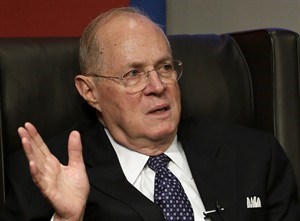
FILE - This Oct. 13, 2013 file photo shows Supreme Court Justice Anthony Kennedy speaking at the University of Pennsylvania law school in Philadelphia. The Supreme Court on Tuesday upheld Michigan's ban on using race as a factor in college admissions. The justices said in a 6-2 ruling that Michigan voters had the right to change their state constitution to prohibit public colleges and universities from taking account of race in admissions decisions. The justices said that a lower federal court was wrong to set aside the change as discriminatory. Kennedy said voters chose to eliminate racial preferences because they deemed them unwise. (AP Photo/Matt Slocum, File)
April 22, 2014 - 7:33 AM
WASHINGTON - The Supreme Court on Tuesday upheld Michigan's ban on using race as a factor in college admissions.
The justices said in a 6-2 ruling that Michigan voters had the right to change their state constitution to prohibit public colleges and universities from taking account of race in admissions decisions. The justices said that a lower federal court was wrong to set aside the change as discriminatory.
Justice Anthony Kennedy said voters chose to eliminate racial preferences because they deemed them unwise.
Kennedy said nothing in the Constitution or the court's prior cases gives judges the authority to undermine the election results.
"This case is not about how the debate about racial preferences should be resolved. It is about who may resolve it," Kennedy said.
In dissent, Justice Sonia Sotomayor said the decision tramples on the rights of minorities, even though the amendment was adopted democratically. "But without checks, democratically approved legislation can oppress minority groups," said Sotomayor, who read her dissent aloud in the courtroom Tuesday. Justice Ruth Bader Ginsburg sided with Sotomayor in dissent.
At 58 pages, Sotomayor's dissent was longer than the combined length of the four opinions in support of the outcome.
Chief Justice John Roberts and Justices Stephen Breyer, Samuel Alito, Antonin Scalia and Clarence Thomas agreed with Kennedy.
Justice Elena Kagan did not take part in the case, presumably because she worked on it at an earlier stage while serving in the Justice Department.
News from © The Associated Press, 2014